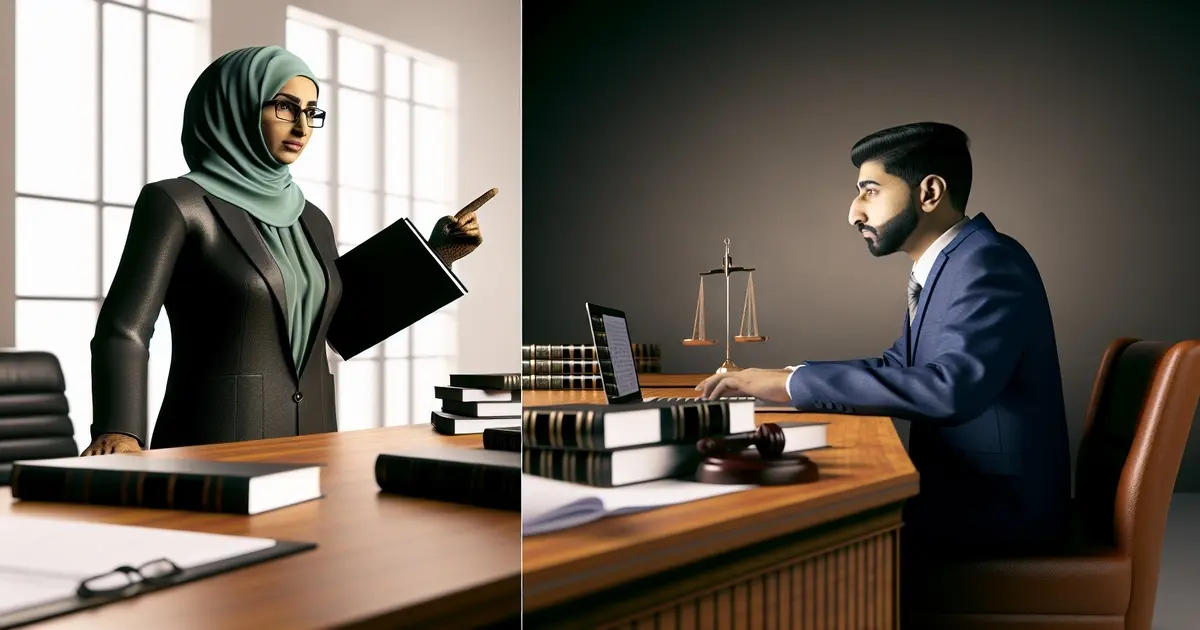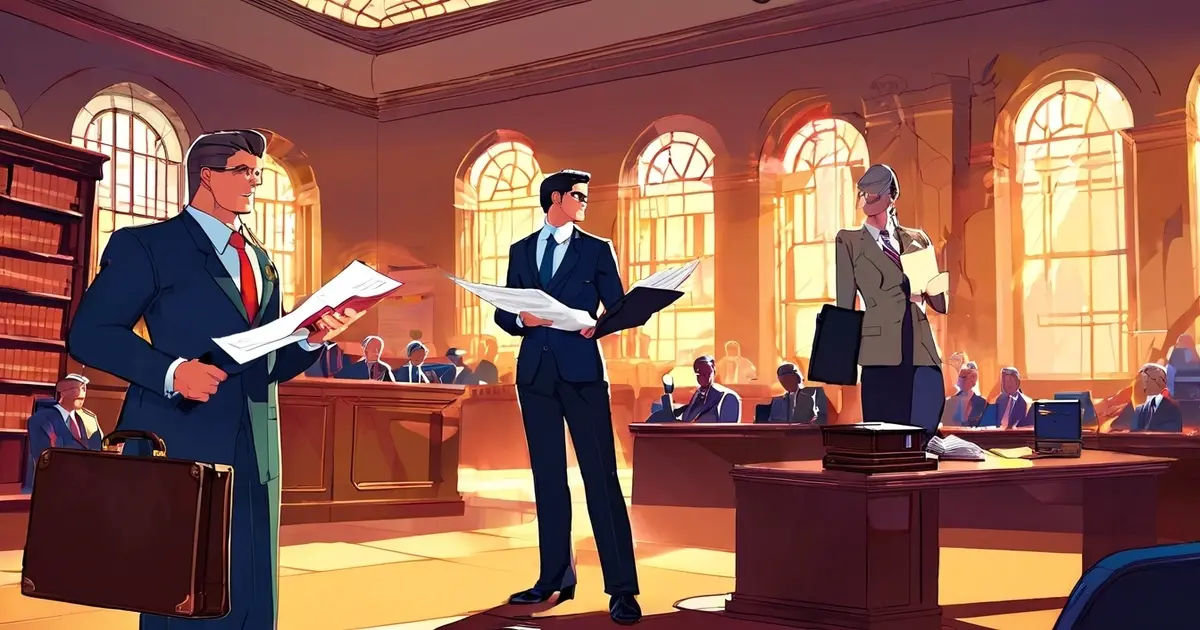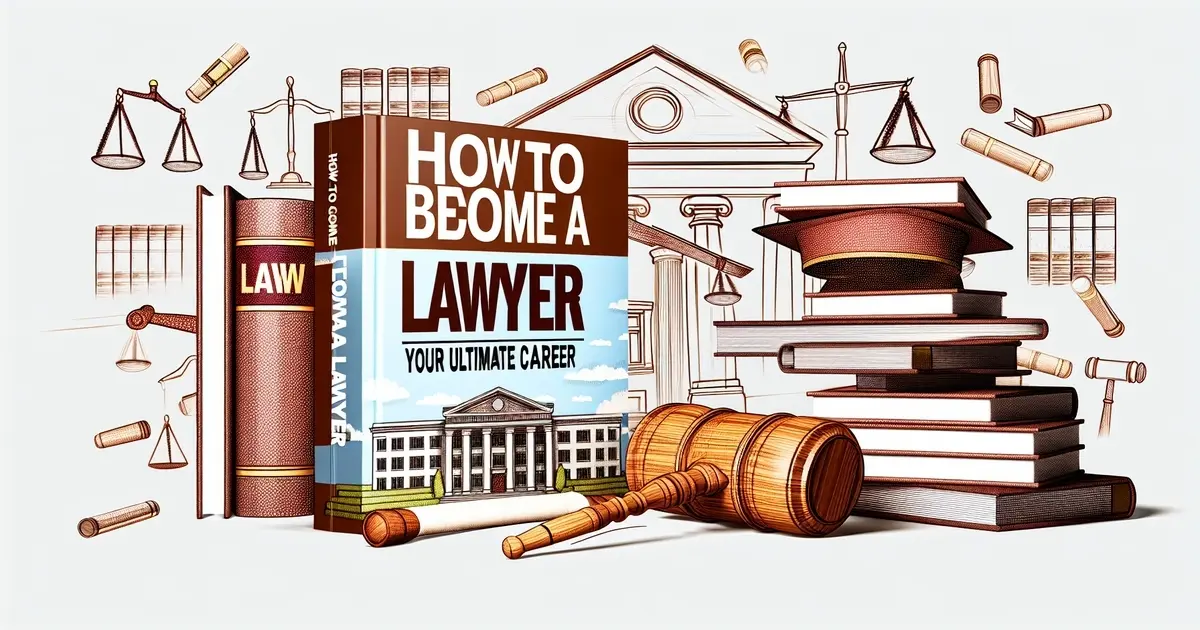Prosecutor vs Lawyer: Exploring Key Differences & Careers
Diving into the legal world can feel like navigating a labyrinth, especially when deciphering roles like those of prosecutors and lawyers. Often lumped together in the public eye, these positions couldn't be more distinct in function and purpose. On one side, you have prosecutors, the legal system's offensive players who bring charges against individuals accused of crimes. Flip the coin, and you'll find lawyers (or defense attorneys) ready to defend those individuals, ensuring their rights are protected at every step. This post aims to strip away confusion and illuminate each role's unique path within our justice system.
Table Of Contents
Understanding the Distinctions Between Prosecutors and Defense Attorneys
Role Differences
Prosecutors play a unique role in the legal system. They represent the state or federal government during criminal trials. Their main goal is to prove guilt beyond a reasonable doubt. This requires strong advocacy skills and analytical thinking as they navigate through evidence to build their case.
Defense attorneys, on the other hand, stand by individuals or entities accused of crimes. Their primary aim is to protect their client's rights, ensuring a fair trial. They tirelessly cast doubt on the prosecution's evidence, aiming for acquittal or lighter sentencing for their clients.
Required Competencies
Becoming a prosecutor demands excellent advocacy skills and an analytical mindset. These professionals must hold authorization to practice law alongside a law degree. Their work is deeply rooted in the common law adversarial system, which pits two opposing sides against each other in court.
Defense attorneys also require robust legal education and licensing but operate with different objectives. They apply abstract legal theories pragmatically to solve specific issues facing their clients, whether negotiating settlements or defending them in courtrooms across various jurisdictions.
Employment Sectors
- Lawyers can find employment across diverse sectors:
- Courts
- Government agencies
- Law firms
- Non-Governmental Organizations (NGOs)
- Legal aid services
- Corporations
This broad spectrum allows lawyers—including defense attorneys—to specialize based on interest areas like civil rights, corporate law, or public defense.
Prosecutors typically work within governmental and judicial systems—either at state levels or federally—focusing solely on criminal cases from investigation stages through sentencing if a conviction occurs.
Roles and Responsibilities of Prosecutors and Lawyers
Legal Action Initiation
Prosecutors play a vital role in the legal system. They initiate legal action against individuals accused of crimes. This involves gathering evidence, preparing cases, and presenting them in court. Their main goal is to prove the defendant's guilt beyond a reasonable doubt.
They work closely with law enforcement to investigate crimes. They decide whether enough evidence exists to file criminal charges. Once they choose to proceed, they become the driving force behind the prosecution's side.
Evidence Presentation
In court, prosecutors have a critical task. They must present evidence effectively to convince judges or juries of the defendant’s guilt. This includes calling witnesses, showcasing physical evidence, and crafting compelling arguments.
Their responsibility extends beyond just winning cases. They must ensure that all proceedings are fair and adhere to ethical standards.
Legal Defense
Defense lawyers provide essential legal representation for those accused of crimes. Unlike prosecutors representing society's interests, defense attorneys advocate for their client's rights and best interests.
They scrutinize the prosecution's evidence for weaknesses or violations of rights. Challenging questionable evidence can lead to reduced sentences or even acquittal for their clients.
Ethical Standards Adherence
Both sides must follow strict ethical standards and legal procedures throughout trials.
For prosecutors, this means offering a fair trial by disclosing any exculpatory evidence that might favor the defense.
Defense lawyers must ensure their client receives a competent defense and uphold justice by not knowingly defending false testimonies.
Key responsibilities include:
- Prosecutors: Initiating prosecutions, presenting case theories
- Lawyers: Defending clients’ rights
Both must:
- Uphold justice
- Adhere strictly to legal ethics

Career Paths: Prosecutor vs. Defense Attorney
Starting Points
Prosecutors typically begin their careers in junior positions. They work on more minor cases at first. Success in these early trials can lead to more significant opportunities.
Defense attorneys, on the other hand, might start in a law firm or launch their private practice. Their starting point often depends on their area of interest and specialization.
Advancement Opportunities
For prosecutors, advancement is closely tied to their case success rate. Winning high-profile cases can significantly boost a prosecutor's career, leading to promotions or offers from prestigious offices.
Defense attorneys have different paths for advancement. Those in private practice may focus on building a solid client base and reputation. Lawyers in firms aim for partnership status through successful case outcomes and contributions to the firm’s growth.
Specialization Impact
Specializing in specific legal areas can affect career trajectories differently for prosecutors and defense attorneys.
Prosecutors might specialize in areas like financial crimes or drug offenses, which could lead them to work with federal agencies or specialized state units.
Defense attorneys often choose specializations based on market demand and personal interests, such as DUI defense or white-collar crime. This choice can influence the types of clients they attract and the complexity of their cases.
Switching Sides
Switching roles between prosecution and defense isn't uncommon and can enrich a lawyer's expertise.
Former prosecutors who become defense attorneys bring valuable insights into the prosecution's operation, aiding strategy development. Conversely, former defense lawyers who turn to prosecution gain an understanding of defensive tactics that could strengthen their prosecutorial approach.
Legal Careers in India: Judges, Prosecutors, and Lawyers
Judges' Role
Judges have a critical role. They oversee court cases. Their job is to ensure fairness. They listen to both sides before making decisions.
Judges base their rulings on law. They interpret laws during trials. This helps them reach fair conclusions.
Prosecutors' Function
Prosecutors are key in criminal cases. The government appoints them. Their main task is conducting prosecutions against those accused of crimes.
They work closely with law enforcement agencies to build strong cases. Their goal is to prove the guilt of the defendant beyond reasonable doubt.
Lawyers' Duties
Lawyers wear many hats in legal battles. They can defend or prosecute in both civil and criminal matters.
They advocate for their clients fiercely, aiming for the best outcomes possible. Lawyers also provide legal advice, helping clients navigate complex legal systems.
Now that we've explored different roles within India's legal system, let's delve deeper into how these careers interplay and contrast.
While judges serve as impartial arbiters ensuring justice based on evidence and law, prosecutors represent the state or public interest in prosecuting criminal offenses diligently; meanwhile, lawyers may switch between defending individuals accused of crimes or representing plaintiffs/victims seeking redressal through civil litigation.
This dynamic ensures a balanced approach towards justice where each role complements yet distinctly differs from others—highlighting specialized paths within the broad field of law for aspiring professionals.
Qualification Requirements for Legal Careers in India
Bachelor's Degree
Obtaining a Bachelor of Laws (LLB) degree is the first critical step to embark on a legal career in India. This program spans three to five years, depending on whether you enter after completing your undergraduate studies or pursue it as an integrated course right after high school.
The curriculum not only covers theoretical aspects but also practical training. It includes moot court sessions and internships with law firms or practicing lawyers. These experiences provide students real-world insights into the legal profession, preparing them for future judges, prosecutors, or lawyer roles.
Bar Examination
After earning an LLB degree, aspiring legal professionals must pass the Bar Examination. This test assesses one’s understanding of the law and readiness to practice in courts across India.
The examination is rigorous and requires thorough preparation. Successful candidates are awarded a certificate that permits them to argue cases before the court. With this certification, one can legally represent clients in courtrooms.
Specialization Qualifications
Additional qualifications may be necessary for those looking to specialize within specific fields of law, such as criminal defense or corporate law.
Specializations allow practitioners to focus their expertise on specific areas of interest. For instance:
- Criminal defense lawyers might undertake courses related to criminology.
- Corporate lawyers could benefit from advanced diplomas in corporate law and management.
This targeted education helps build more profound knowledge and skills pertinent to their chosen field.
Can Attorneys Practice Both Defense and Prosecution?
Career Paths
Attorneys often have to choose between defense and prosecution early in their careers. This decision shapes their path forward, with most sticking to one side of the courtroom for the duration of their practice.
Much like any other, the legal profession offers various paths one can take. In India, as mentioned earlier regarding qualifications for legal careers, this choice comes after obtaining the necessary education and passing bar examinations. Once these hurdles are cleared, attorneys must decide where to focus: defending those accused of crimes or prosecuting alleged offenders on behalf of the state or government. The system is designed such that an attorney typically aligns with either defense or prosecution roles but not both at once.
Ethical Considerations
Ethical rules are a big part of why lawyers don't switch sides in the same case. It's about fairness and integrity.
Imagine you're playing a game where, halfway through, someone switches teams, taking all your strategies with them. It wouldn't feel fair, right? That's how it works in law, too. Lawyers are privy to confidential information from their clients, which could be used unfairly if they were allowed to swap sides easily within cases. Ethical guidelines strictly limit changing allegiances during proceedings to maintain trust in the legal system’s fairness and protect client confidentiality.
Cross-Experience Value
Gaining experience on both sides of criminal law is considered valuable but usually happens over time rather than simultaneously.
Starting as a prosecutor might give an attorney insights into how cases are built against defendants—knowledge that can be useful if they become defense lawyers later. Conversely, starting in defense lays the groundwork for understanding challenges faced by individuals against whom charges are brought; this perspective can enrich prosecutorial tactics if an attorney shifts later in their career.
Lawyers often transition from one role to another sequentially throughout their careers rather than juggling both at once:
- Begin a career focusing on either prosecution or defense based on personal interest.
- Gain extensive experience within chosen specialty.
- Potentially switch roles later in career for broader perspective and skill set enhancement.
Education Levels of Defense Attorneys and Prosecutors
Law Degree Necessity
Both defense attorneys and prosecutors must earn a law degree. This is the first big step in their careers. They spend years in law school, learning about different aspects of the legal system.
After graduating, they face another challenge: the bar examination. Passing this tough test proves they understand the law well enough to practice it. This is a must for anyone wanting to become a lawyer or prosecutor in the United States.
Continuing Education
Staying updated on laws is crucial for lawyers and prosecutors. Continuing legal education (CLE) is not just recommended; it's often required.
Lawyers participate in seminars, workshops, and courses throughout their careers. These events cover recent changes in laws and best practices in law enforcement.
Specialized Training
Depending on their interests, lawyers might pursue specialized training. For example:
- A defense attorney interested in cybercrimes might take courses related to digital forensics.
- A prosecutor focusing on environmental cases could seek training specific to environmental legislation.
This specialized knowledge helps them perform better in their chosen fields.

Transitioning from a Prosecutor to a Judge in India
Legal Experience
Becoming a judge in India is not just about wearing the robe and wielding the gavel. It demands significant legal experience. Prosecutors eyeing this transition must have demonstrated an ability to navigate complex legal waters with skill and integrity.
Prosecutors spend years building their reputations, handling everything from minor offenses to high-profile cases. This journey shapes them into law experts, ready for new challenges. Their courtroom experiences teach them not just about legal procedures but also about fairness and justice.
Reputation Matters
For those looking to leap from prosecutor to judge, being known for fairness plays a pivotal role. A reputation for impartiality and integrity can set candidates apart in this competitive field.
The selection process often involves evaluations by peers or appointments by higher authorities, depending on where you are in India. Being seen as fair-minded makes one a stronger candidate for judicial positions. It's not just about what you know; how you apply your knowledge matters greatly.
Selection Process
In many jurisdictions within India, transitioning from prosecutor to judge involves being selected or elected based on specific practices. Each state might have its rules governing this process, making it essential for aspiring judges to be well-versed with these regulations.
Some may do rigorous interviews, while others might need endorsements from senior judiciary or legal community members. Knowing the ins and outs of these processes can significantly boost one’s chances of selection.
Career Pinnacle
For many prosecutors, becoming a judge is seen as reaching the pinnacle of their careers—a symbol of achieving great respect within the legal community.
This transition isn't merely a change in job title; it represents years of hard work coming to fruition. Judges hold immense responsibility for shaping laws that affect millions.
As such, when prosecutors step into their new roles as judges, they bring invaluable insights gained while advocating before courts across India.
Differences Between an Advocate and a Lawyer
General Term
A lawyer is anyone who has studied law. They can give legal advice. This term covers all professionals in the field of law.
Lawyers have a broad understanding of the law. They help clients with various legal issues. Lawyers draft documents, contracts, and wills, too.
Court Representation
An advocate, on the other hand, represents clients in court. They are specialized lawyers who argue cases before judges.
To become an advocate, one must pass additional exams. These qualifications allow them to work in higher courts.
Advocates focus more on litigation than general legal advice. Their main job is to fight for their client's rights in courtrooms.
Access and Qualifications
Only advocates have access to argue in higher courts. This is due to their extra qualifications.
These qualifications ensure they understand complex courtroom procedures.
- Advocates must know how to present cases effectively.
- They need excellent speaking skills for arguments.
Lawyers provide support outside of these high-stakes environments.
- Lawyers often work behind the scenes.
- They prepare case files and offer strategic advice.
You've seen the ropes in the legal world—from the gritty details distinguishing prosecutors from lawyers to the unique paths carving out careers in India. It's a realm where words wield power and roles define battles. You've walked through corridors of education requirements, peeked into the transition from prosecutor to judge, and even decoded the advocate-lawyer enigma. Now, armed with knowledge, you stand at a crossroads. Whether you're eyeing the courtroom's frontlines or satisfying a curiosity, remember that the legal landscape is vast and filled with opportunities for those brave enough to navigate its complexities. So, what's your next move? Will you dive deeper into this fascinating world, perhaps considering a career that aligns with your newfound insights? The gavels are in your court—make it count.
Frequently Asked Questions
What's the difference between a prosecutor, who handles criminal charges and legal proceedings, and a lawyer providing legal representation?
Prosecutors are specialized lawyers representing the government in criminal cases, aiming to prove the defendant's guilt. Meanwhile, lawyers can cover a broader range of legal services, including defense and representing individuals or entities in various legal matters.
Can someone be a prosecutor and a defense attorney in legal proceedings, handling criminal charges and legal representation?
Yes, but not at the same time. Lawyers can switch roles throughout their careers but cannot hold both positions simultaneously due to conflict of interest concerns. It’s like playing for two soccer teams in one tournament; you’ve got to pick your side!
How do I become a prosecutor or defense attorney in India, understanding the difference from legal proceedings in the United States?
To kickstart your career as either, you must complete an LLB degree from a recognized university and pass the Bar Council Exam. Think of it as getting your passport stamped for entry into the world of law.
Are there different education levels for prosecutors vs. defense attorneys?
Nope! Both prosecutors and defense attorneys start with similar educational foundations: typically, an undergraduate degree followed by law school (LLB). It’s more about where your passion lies—defending or prosecuting—that determines your path afterward.
Can prosecutors transition to becoming judges in India?
Absolutely! With enough experience and passing relevant examinations, prosecutors can climb the ladder to become judges. Imagine moving from being part of one team on the field to refereeing the game instead.
What is an advocate compared to a lawyer?
In some contexts, "advocate" refers explicitly to lawyers representing clients in court. In contrast, "lawyer" is more umbrella-like, covering all legal practitioners regardless of whether they step into courtrooms. Think of all squares as rectangles but not all rectangles as squares.
Related Post
Lawyer vs Doctor
Have you ever wondered what skills it takes to walk in the shoes of a lawyer, with their court advocacy, or a doctor, and what salary might come with those professions?
Read MoreSports Agent vs Sports Lawyer
Navigating the competitive realm of professional sports requires more than talent, hard work, and an attorney. Behind every successful athlete, a duo often plays a pivotal role off the field: the sports agent and the sports lawyer, usually doubling as an attorney.
Read MoreEstate Planning Lawyer vs Trusts and Estates Lawyer
Have you ever wondered why navigating the maze of estate planning, with its court laws, executor duties, and invaluable guidance, feels so daunting?
Read MoreAttorney vs Lawyer
Have you ever been in a heated debate about the difference between an attorney and a lawyer? It's not just semantics; there's a real distinction that could affect your choice when seeking legal help.
Read MoreHow to Become a Lawyer
Did you know that there are over 1.3 million active attorneys in the United States alone, including law students from law schools and those in law firms practicing law?
Read MoreWhy Become a Lawyer?
Have you ever wondered what drives someone to choose the path of law, a practice area filled with legal issues, as their question of time?
Read More






